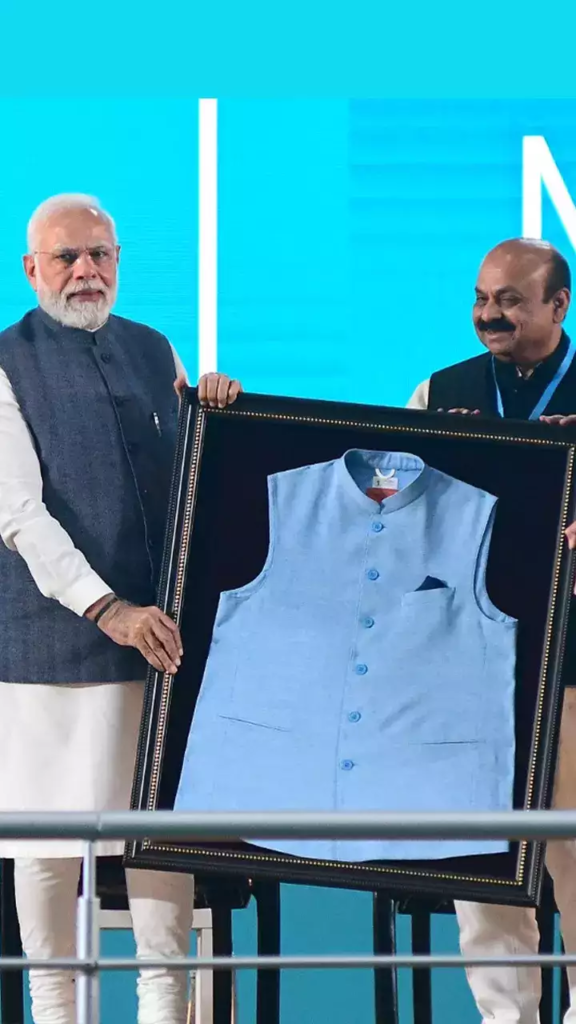-By Ankita Dutta
Summary
Recent events in India’s fashion sector, including Prime Minister Modi’s recycled PET bottle jacket and the re-entry of Shein, have sparked discussions about sustainable fashion. Experts stress the environmental impact of fast fashion and the need for major retailers to reduce their supply. Shree Renga Polymers offers sustainable alternatives through their EcoLine Clothing brand and encourages product recycling. However, the return of Shein indicates the challenges of transitioning to sustainable fashion in India’s consumer market.
Two recent events have shed light on India’s fashion sector, prompting discussions about sustainable fashion. Firstly, Prime Minister Narendra Modi made a statement by wearing a jacket made from recycled PET bottles to the G7 summit. Secondly, Chinese fast fashion giant Shein announced its re-entry into the Indian retail market in collaboration with Reliance Retail. These developments have raised contrasting points about the urgent need for sustainable fashion and the prevalence of consumerism.
K Sankar, managing partner of Shree Renga Polymers, the company that produced Modi’s jackets, emphasizes the importance of slowing down and embracing sustainable fashion.

Fast fashion, known for its affordability and availability, fails to prioritize sustainability. Most fast fashion items utilize synthetic materials derived from crude oil, resulting in a significant environmental impact. The production of synthetic fibres used in fast fashion generates 70 million barrels of oil annually and emits 262% more CO2 compared to cotton shirts.
Despite its environmental consequences, fast fashion continues to appeal to customers due to its low prices. Subrata Siddhanta, former head of Zudio, a Tata Group-owned affordable fast fashion brand, acknowledges that the market’s abundance of cheaply priced products attracts consumers.

He emphasizes that fast fashion’s popularity is driven by customer preference rather than the durability of the products. Although fast fashion items are durable, people desire frequent changes in their clothing and wardrobes. Interestingly, there is currently an excess of clothes, with enough garments to last six generations if production were to cease immediately. While encouraging giant retailers to decrease their supply would be a significant move towards sustainable fashion, it alone will not fully address the issue.
To achieve truly sustainable fashion, major retailers must reduce their supply. However, Siddhanta suggests taking inspiration from Mahatma Gandhi’s Khadi movement, which promoted the use of natural fibers like cotton. Although global cotton production falls short of demand, companies like Shree Renga Polymers, through their EcoLine Clothing brand, offer viable alternatives.
Shree Renga Polymers, owning the EcoLine Clothing brand, is a company that can contribute to addressing the issue of sustainability in the fashion industry. With an annual turnover of Rs 100 crore (~US$12 million), the Karur-based company is already selling its products in India and overseas and aims to establish EcoLine Clothing as a renowned international brand. Initially, the company focused on collecting and supplying raw material to fibre companies by crushing plastic (PET) bottles. They later transitioned into the fibre business after seven years and started converting the fibre into yarn, which they sold to textile companies. The launch of EcoLine Clothing followed just three years later in 2021.
Furthermore, customers are encouraged to return their products for further recycling.
Despite the additional costs associated with these sustainable practices, such as slightly higher product prices, they contribute to a circular economy. Besides recycled polyester, Shree Renga Polymers plans to explore the use of organic fibres such as hemp, jute, and even lotus to create a range of new sustainable products. The ultimate goal is for sustainable materials to become the norm in the fashion industry.
However, the return of Shein to the Indian market highlights the ongoing dominance of fast fashion, suggesting that a slow and sustainable fashion movement may take some time to gain traction in India’s consumer market.

